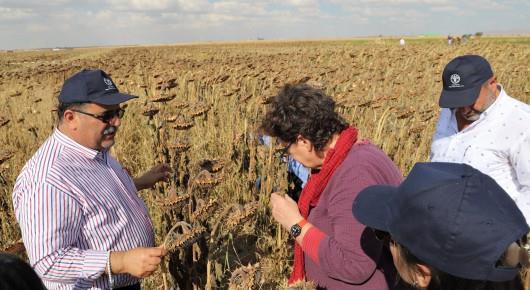FAO helps develop the curricula for Turkey’s new Farmer Field Schools

“So how do you say ‘Farmer Field School’ in Turkish?” asked Marjon Fredrix, as she began her comprehensive presentation on the subject in Turkey’s Konya province.
It would not be an exaggeration to say that Fredrix, an agricultural officer from FAO’s Plant Production and Protection Division, has travelled around the world to help promote Farmer Field Schools, but this was her first time in Turkey.
“All locations have different characteristics that need to be considered when developing learning objectives for Farmer Field Schools,” she later added.
Held in Konya, Turkey, between 9 and 12 October, in cooperation with Turkey’s Ministry of Agriculture and Forestry, FAO’s Farmer Field School Curriculum Development Workshop hosted wide-ranging discussions on how best to further adopt the Farmer Field School method in the region. The workshop was organized within the context of the “Sustainable land management and climate-friendly agriculture” project, which is funded by the Global Environmental Fund and implemented by FAO in the Konya Closed Basin, in coordination with the Ministry of Agriculture and Forestry. The project’s Farmer Field School development activities represent the first programmatic effort in the country to help promote this participatory, innovative method of agricultural learning on a large scale.
In Farmer Field Schools, small groups of farmers meet weekly over the course of a season with a trained facilitator in a local field, observing and comparing two plots of crops. One plot uses local conventional methods, while the other is used to experiment with what could be considered “best practices.” The farmers measure plant development, take samples of insects, weeds and diseased plants, compare the characteristics of different soils and construct simple cage experiments. These comparisons allow the farmers to decide for themselves what works best, based on their own testing and observations. Farmer Field Schools provide risk-free settings in which to discuss, dissect, modify and experiment with new agricultural management ideas.
Accompanying Fredrix in Konya was Fazıl Düşünceli, a fellow agricultural officer with FAO’s Plant Production and Protection Division.
“While the farmer community in and around Konya has always been up to date with new technologies, the Farmer Field School method aims to introduce a more structured and participatory way of collaboratively studying common problems and finding the most effective solutions,” Düşünceli said. “Learning by doing, which is at the heart of Farmer Field Schools, requires actively facilitating the sharing of knowledge.”
After Fredrix’s presentation, participants – including farmers, agricultural extension services specialists, environmental experts and decision makers – formed small groups to focus on how Farmer Field Schools can be utilized in the production of various crops. Despite being known colloquially as “Turkey’s grain silo,” Konya’s fertile yet endangered lands enable the cultivation of many other plants, including sugar beets, maize, sunflowers and apple trees. Düşünceli and Suzanne Phillips, also of FAO’s Plant Production and Protection Division, presented a list of crops widely planted in Konya and neighboring Karaman to help form the workshop teams.
Phillips’s focus is on utilizing community-based approaches in building climate resilience in agriculture. Her teamwork icebreaker sessions, conducted throughout the workshop, were very popular with the participants.
“Let’s try an exercise that helps us analyze the context in which participatory learning happens,” she announced as workshop teams reconvened for the second day of the event at a sunflower farming field in Konya’s Hotamış Village, in the district of Karapınar.
“The facilitator’s role in Farmer Field Schools is to make sure that not only everyone is heard, but also that everyone’s experience is taken into account,” Phillips explained. “Allowing experience to be shared in a well-organized way is perhaps the primary advantage of the approach.”
After exploring the field of sunflowers in Hotamış village, the participants were able to put together a wealth of information on the characteristics of the soil, irrigation quality, and pests in the area. In a farmer field school, the next stage would build on these analyses and the participants would begin experimenting with different techniques of production, comparing progress in plots that have used conventional methods and alternative options, Fredrix explained.
“The opportunity to evaluate traditional approaches and newer methods such as direct seeding side-by-side is very useful in promoting climate-friendly agriculture,” added Fatma Güngör, FAO’s national project coordinator for the “Sustainable land management and climate-friendly agriculture” project in Turkey. “It enables demonstrating the sustainability and productivity benefits of conservation agriculture at the same time.”
The first Farmer Field School activities in the project pilot sites in Konya and Karaman started in 2016 with the development of six schools, and five more schools were established in 2017. The learning objectives for each school are carefully developed, taking into account the input of farmers and extension specialists. FAO provides technical support to the schools and helps collect and analyse data on the socio-economic context of agricultural production.
“We aim for Farmer Field Schools to become a leading method in agricultural learning,” noted Sheikh Ahaduzzaman, FAO Turkey programme officer, as the workshop drew to a close. “Through Farmer Field Schools, we can help strengthen farmers to better analyse ecological processes, find collective solutions to the problems they encounter and have better understanding of local challenges.”
26 October 2018, Ankara, Turkey
